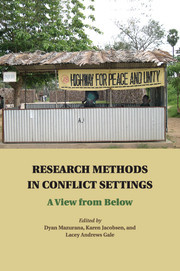Description
Research Methods in Conflict Settings
A View from Below
Coordinators: Mazurana Dyan, Jacobsen Karen, Andrews Gale Lacey
This volume compiles lessons learned by field researchers, many of whom have faced demanding situations characterized by violence, distrust and social fragmentation.
Language: English
Subject for Research Methods in Conflict Settings:
Research Methods in Conflict Settings
Publication date: 12-2014
Support: Print on demand
Publication date: 12-2014
Support: Print on demand
Research Methods in Conflict Settings
Publication date: 07-2013
344 p. · 15.2x22.9 cm · Hardback
Publication date: 07-2013
344 p. · 15.2x22.9 cm · Hardback
Description
/li>Contents
/li>Biography
/li>
Increasing numbers of researchers are working in regions experiencing high levels of conflict or crisis, or among populations that have fled violent conflict to become refugees or internally displaced persons. Understanding these conflicts and their aftermath should be shaped not only by the victors and their elite companions but also by the local people whose daily lives become intertwined with the conflict - this 'view from below' is explored in this volume. Conducting rigorous research in these contexts presents a range of ethical, methodological, logistical and security challenges not usually confronted in non-conflict field contexts. This volume compiles lessons learned by experienced field researchers, many of whom have faced demanding situations characterized by violence, distrust and social fragmentation. The authors offer options for studying the situations of people affected by conflict and, by focusing on ethical and security issues, seek ways to safeguard the interests and integrity of the research 'subjects' and of the researchers and their teams.
1. A view from below: conducting research in conflict zones Dyan Mazurana, Lacey Gale and Karen Jacobsen; 2. The other side of the country: filming the human experience of war Catherine Hébert; 3. Negotiating identity, space, and place among Iraqi women refugees in Jordan Isis Nusair; 4. Reflections on ethical and practical challenges of conducting research with children in war zones: toward a grounded approach Michael Wessells; 5. Researching social life in protracted exile: experiences with Sudanese refugees in Uganda 1996–2008 Tania Kaiser; 6. 'I love my soldier' developing responsible and ethically sound research strategies in a militarized society Cathrine Brun; 7. Power dynamics and the politics of fieldwork under Sudan's prolonged conflicts Jok Madut Jok; 8. Reporting the story: thoughts for reporting on violent groups in a turbulent environment Molly Bingham and Steve Connors; 9. Establishing a policy research organization in a conflict zone: the case of the Afghanistan research and evaluation unit Paul Fishstein and Andrew Wilder; 10. Conducting research in conflict zones: lessons from the African great lakes region Timothy Longman; 11. Preparing for research in active conflict zones: practical considerations for personal safety Dyan Mazurana and Lacey Gale; 12. Afterword Elisabeth Wood.
Dyan Mazurana is Associate Research Professor at the Fletcher School, and Research Director of Gender, Youth, and Community at the Feinstein International Center, Tufts University. Mazurana's areas of specialty include women's and children's rights during and after armed conflict, armed opposition groups' serious crimes and violations committed during armed conflict, and remedy and reparation. Her most recent books include After the Taliban: Life and Security in Rural Afghanistan (2008, with Nojumi and Stites), and Gender, Conflict, and Peacekeeping (2005, with Raven-Roberts and Parpart). She has published more than seventy scholarly and policy books, articles and international reports in numerous languages.
Karen Jacobsen is Associate Professor at the School of Nutrition and Science Policy, and teaches at the Fletcher School, Tufts University. She is based at the Feinstein International Center where she leads the Refugees and Forced Migration Program. Jacobsen's current research focuses on urban refugees and internally displaced persons in Africa, and on livelihood interventions in conflict-affected areas. Her most recent book, The Economic Life of Refugees, was published in 2005. She teaches courses on field research methods and on forced migration.
Lacey Gale is Visiting Fellow at the Feinstein International Center, Tufts University, and Research Associate in the Africana Studies Program at Bowdoin College. Her current research focuses on community leadership, healing and storytelling among refugee diasporas in the United States. Gale has worked with refugee populations in West Africa and the United States since 1998. She has conducted research and written on issues of gender and family, child fostering, youth leadership, durable solutions, host-refugee relationships, and transnational connections and remittance sending among refugee diasporas.
Karen Jacobsen is Associate Professor at the School of Nutrition and Science Policy, and teaches at the Fletcher School, Tufts University. She is based at the Feinstein International Center where she leads the Refugees and Forced Migration Program. Jacobsen's current research focuses on urban refugees and internally displaced persons in Africa, and on livelihood interventions in conflict-affected areas. Her most recent book, The Economic Life of Refugees, was published in 2005. She teaches courses on field research methods and on forced migration.
Lacey Gale is Visiting Fellow at the Feinstein International Center, Tufts University, and Research Associate in the Africana Studies Program at Bowdoin College. Her current research focuses on community leadership, healing and storytelling among refugee diasporas in the United States. Gale has worked with refugee populations in West Africa and the United States since 1998. She has conducted research and written on issues of gender and family, child fostering, youth leadership, durable solutions, host-refugee relationships, and transnational connections and remittance sending among refugee diasporas.
© 2024 LAVOISIER S.A.S.




